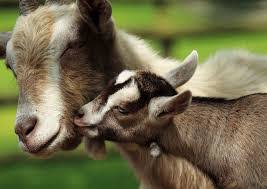A Holy People
23: 18-19
A holy people DIG: What two national festivals were these mitzvoth applied to? What was the purpose of these mitzvoth? What was the central point of these four mitzvot?
REFLECT: What have you sacrificed to God this week? How has it drawn you closer to the Lord and made you more holy? Who are the Canaanites where you live and what should you avoid?
As a holy people, the Israelites were set apart from all the other nations because the holy presence of ADONAI was with them, and they received God’s holy Torah.
These sacrificial practices also applied to two of the three three national festivals. Therefore, yeast needed to be removed from their houses during the festival periods. We see in this mitzvah elements of mercy, repulsion at reversing the natural laws of nurture and compassion, and a separation between a life (mother’s milk) and death (meat). All of these are revelations of holiness.
Each of these mitzvot have to do with a religious festival. The first two have to do with the eight-day celebration of Pesach and Hag ha’Matzah, and the second two have to do with Shavu’ot. All four of these actions could be offensive to ADONAI: offering a sacrifice containing yeast (the symbol for sin in the TaNaKh) would be offensive; saving festival offering until the next morning would be offensive; not bringing the best of their firstfruits would be offensive; and not cooking a young goat in its mother’s milk would be hyperbole (presenting the mitzvot in its most extreme for to drive home the point), not recognizing the bond between a mother and her offspring (in the spring during calfing season) would be offensive. So this wasn’t merely a “because I said so” mitzvot, but it helps us slow down and realize that these are not just technical mitzvot, but stand for a value. That we should get to the point where we think we can provide for ourselves, but that ADONAI is the source of all of our food. Therefore, these four mitzvot would pont to the Israelites being a holy people (see the commentary on Deuteronomy Cw – A Holy People).
 The substitutional sacrifice of animals was to be done in four specific ways. First, God, said: Do not offer the blood of a sacrifice to Me along with anything containing yeast. Because yeast was a symbol of sin in the Scriptures. Secondly, He said: The fat of My festival offerings must not be kept until morning. It needed to be either eaten or destroyed. That commandment had been specifically related to the Passover, but then it became foundational to the agricultural calendar of Isra’el. Thirdly, He said: Bring the best of the firstfruits of your soil to the house of ADONAI your God. This was so important that both holy names were used. Lastly, God said: Do not cook a young goat in its mother’s milk. What do these three mitzvot have to do with each other?
The substitutional sacrifice of animals was to be done in four specific ways. First, God, said: Do not offer the blood of a sacrifice to Me along with anything containing yeast. Because yeast was a symbol of sin in the Scriptures. Secondly, He said: The fat of My festival offerings must not be kept until morning. It needed to be either eaten or destroyed. That commandment had been specifically related to the Passover, but then it became foundational to the agricultural calendar of Isra’el. Thirdly, He said: Bring the best of the firstfruits of your soil to the house of ADONAI your God. This was so important that both holy names were used. Lastly, God said: Do not cook a young goat in its mother’s milk. What do these three mitzvot have to do with each other?
The particular prohibition of not cooking a young goat in its mother’s milk would be repeated three times in the Torah (Exodus 23:19b, 34:26, Deuteronomy 14:21). An additional reason for the prohibition was that the Canaanites, after boiling the young goat they would take the milk and sprinkle all the trees, fields, gardens, and orchards around for the purpose of making them more fruitful the following year. Then they would eat the young goat.447 Therefore, because it was an act of idolatry, God forbid it. On that note, the commandments of the Book of the Covenant come to an end.
An orthodox Jewish home always has two sets of dishes, pots, and pans. One set is used exclusively for meat and the other for dairy products. If one accidentally uses a meat dish and puts cheese on it, that dish is defiled and has to be destroyed.



Leave A Comment